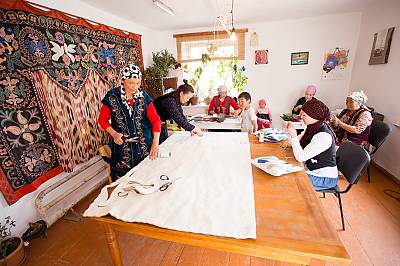The scale of the pandemic has impacted the practice and transmission of crafts in the Kyrgyz Republic. A number of projects, as well as exhibitions and master classes have been canceled.
At the same time, Kyrgyz craftswomen are finding ways to support their creative sector during the coronavirus lockdown. Craftswomen are demonstrating that it is still possible to promote and practice the cultural heritage during the pandemic, when it is forbidden to socialize and move around.
Craftswomen of Shyrdak and Ala Kiyiz, the art of Kyrgyz traditional felt carpets promoting online trainings and networking events for free. Ala-kiyiz and Shyrdak, the art of Kyrgyz traditional felt carpets was inscribed on the List of Intangible Cultural Heritage in Need of Urgent Safeguarding in 2012.
This element reflects a living history of the Kyrgyz people, which are rich with important cultural components, providing Kyrgyz people with a sense of identity. Craftswomen of Shyrdak and Ala Kiyiz are offering people traditional skills and knowledge as well as unique story and technique of making traditional felt carpets and ornaments over the duration of the pandemic.
The coronavirus has so far infected a lot of people, limiting physical contact with others, while people are stuck inside their own homes. Therefore, people are looking for ways to distract themselves, while crafting can help people alleviate pandemic anxiety.
Craftswomen say that crafting allows them to stop worrying and eases stress during the pandemic, as crafting something for ourselves may help people with a sense of self-efficacy. In addition, the interest in crafting among people, especially among the younger generation has increased.
Craftswomen are transmitting their knowledge and skills not only via Internet, but also informally to their children and grandchildren at home. Accordingly, the craftswomen is managed to create a communication and transmit their skills to individuals and young people so that the thread of transmission of the element is not interrupted.
Les désignations employées et la présentation des textes et des documents référencés dans cette plateforme n'impliquent de la part de l'UNESCO aucune prise de position quant au statut juridique des pays, territoires, villes ou zones, ou de leurs autorités, ni quant au tracé de leurs frontières ou limites.
